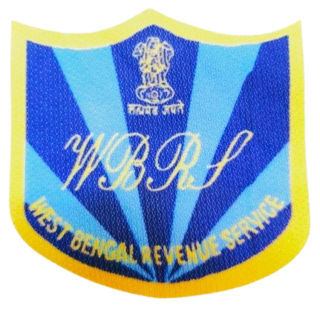Related Research Articles

HM Customs and Excise was a department of the British Government formed in 1909 by the merger of HM Customs and HM Excise; its primary responsibility was the collection of customs duties, excise duties, and other indirect taxes.

The district magistrate, also known as the district collector or deputy commissioner, is a career civil servant who serves as the executive head of a district's administration in India. The specific name depends on the state or union territory. Each of these posts has distinct responsibilities, and an officer can assume all of these roles at once. The district magistrate is primarily responsible for maintaining law and order, while the district collector focuses on land revenue administration, and the deputy commissioner is in charge of overseeing developmental activities and coordinates government departments. Additionally, they also serve as election officers, registrar, marriage officer, licensing authority, and managing disaster responses, among other things. While the specific scope of duties may vary from state to state, they are generally similar. The district magistrate comes under the general supervision of divisional commissioner.
The All India Services (AIS) comprises three Civil Services of India common to the centre and state governments, which includes the Indian Administrative Service (IAS), the Indian Police Service (IPS), and the Indian Forest Service (IFS). Civil servants recruited through All India Services by the central government are assigned to different state government cadres. Some civil servants may, later in their career, also serve the centre on deputation. Officers of these three services comply to the All India Services Rules relating to pay, conduct, leave, various allowances etc.

A sub-divisional magistrate, also known as sub collector, revenue divisional officer, or assistant commissioner, is the administrative head of a sub-division in an Indian district, exercising executive, revenue, and magisterial duties. The specific name depends on the state or union territory. The primary responsibilities include revenue collection, maintaining law and order, overseeing developmental activities and coordinating various departments within a sub-division.
A deputy commissioner is a police, income tax or administrative official in many countries. The rank is commonplace in police forces of Commonwealth countries, usually ranking below the Commissioner.

The West Bengal Police is one of the two police forces of the Indian state of West Bengal. The other being the Kolkata Police, which has a separate jurisdiction across Kolkata.

The Indian Revenue Service, often abbreviated as IRS, is a civil service that is primarily responsible for collecting and administering direct and indirect taxes. As a central civil service under Group A of the executive branch of the Government of India, it functions under the Department of Revenue of the Ministry of Finance and is under the administrative direction of the Revenue Secretary and the ministerial command of the Minister of Finance.

In Bangladesh, India, and Pakistan, a tehsildar, talukdar, or mamlatdar is a land revenue officer accompanied by revenue inspectors. They are in charge of obtaining taxes from a tehsil with regard to land revenue. A tehsildar is also known as an executive magistrate of the relevant tehsil. The immediate subordinate of a tehsildar is known as a naib tehsildar.
Rajasthan Administrative Service, popularly known as RAS, is a state civil service of state Rajasthan along with Rajasthan Accounts Service, Rajasthan Police Service and other services. The officers are included in the state cadre of civil service officers. RAS officers undergo two years training at HCM Rajasthan State Institute of Public Administration. Cadre controlling authority for this service is Department of Personnel, Government of Rajasthan. The head of this service is Chief Secretary.

Gazetted officers in India include all Indian Police Service (IPS) officers, who are classified as Group A officers, as well as State Police Service officers at the rank of Deputy Superintendent of Police (DSP) and above. These officers are organized in a structured hierarchical order.
In India, the Civil Service is the collection of civil servants of the government who constitute the permanent executive branch of the country. This includes servants in the All India Services, the Central Civil Services, and various State Civil Services.
The 1931 New Year Honours were appointments by King George V to various orders and honours to reward and highlight good works by citizens of the United Kingdom and British Empire. They were announced on 30 December 1930.

Doddakoppalu Kariyappa Ravi was an Indian Administrative Service officer of Karnataka cadre, from the 2008 batch. He first came into limelight as a deputy commissioner of the Kolar district, after launching an official crackdown against the encroachment of government lands and rampant illegal sand mining in the district. Following fourteen months of service, he was transferred to Bangalore by the government of Karnataka as Additional Commissioner of Commercial Taxes (Enforcement) in October 2014. After his five months' tenure as additional commissioner which involved tax raids on major tax-evading real estate firms, he was found dead at his residence in Bangalore on 16 March 2015, under suspicious circumstances.

Provincial Civil Service / Provincial Civil Service , often abbreviated to as PCS, is the administrative civil service of the Government of Uttar Pradesh comprising Group A and Group B posts. It is also the feeder service for Indian Administrative Service in the state.
Valluri Kameswara Rao was an Indian Civil Service officer and Chief Secretary of Andhra Pradesh, and the oldest living officer of the Indian Civil Service at the time of his death. He served in the civil service of the British Raj as a collector and magistrate. After Independence Rao joined the Indian government's finance department and transferred into the newly founded Indian Administrative Service. He transferred to Andhra State after it was founded in 1953. After the founding of Andhra Pradesh in 1956 Rao became that state's first secretary of public works. He later served the central government on the Planning Commission before returning to Andhra Pradesh as its chief secretary. Rao was principal secretary to the President of India Neelam Sanjiva Reddy from 1981 to 1982.
Deputy commissioner is a chief administrative, land revenue officer/collector and representative of government in district or an administrative sub-unit of a division in Pakistan. The office-holder belongs to the commission of Pakistan Administrative Service erstwhile DMG/CSP or the Provincial Management Service erstwhile Provincial Civil Service.
In India, the police forces of the states and union territories are responsible for law enforcement in the states and union territories. Police and Public Order are State subjects under the Seventh Schedule to the Constitution of India.
Assistant commissioner is a rank used in revenue administrations, including those of Bangladesh, India, and Pakistan.

West Bengal Revenue Service (WBRS) is one of the Group A services under West Bengal Civil Services, recruited through a competitive examination conducted by West Bengal Public Service Commission. The service was created in 2017 merging four erstwhile services concerning revenue matter and revenue collection. It functions under the Revenue Branch and overall administrative control of Department of Finance.

Provincial Civil Service (IAST: Prāntīya Sivila Sevā, often abbreviated to as PCS, is the administrative civil service of the Government of Uttarakhand comprising Group A and Group B posts. It is also the feeder service for Indian Administrative Service in the state.
References
- ↑ About PSC, West Bengal psc.wb.gov.in
- ↑ "Situation of country grim, politics of isolation not correct, says Mamata". www.millenniumpost.in. 4 May 2022. Retrieved 4 May 2022.
- ↑ "WBCS officers list as on 14-11-2024" (PDF), Government of West Bengal
- ↑ "Gradation List of WBPS Officers (as on 01.05.2024)" (PDF). wbpolice.gov.in. Retrieved 17 November 2024.
- ↑ "WBCS (Gr-C) new appointee of 2018", PSCWB
- ↑ "Groups of Services of WBCS". WBCSMadeEasy. Retrieved 8 December 2018.
- ↑ "WB CM announces incentives for WBCS officers". All India Trinamool Congress. Retrieved 1 May 2020.
- ↑ "WBCS Job Profile". Edufever Jobs. 24 April 2020. Retrieved 22 April 2021.